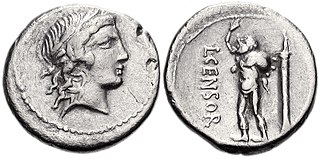Related Research Articles
This article concerns the period 89 BC – 80 BC.

Marcus Licinius Crassus was a Roman general and politician who played a key role in the transformation of the Roman Republic into the Roman Empire. He is often called "the richest man in Rome".
Year 82 BC was a year of the pre-Julian Roman calendar. At the time it was known as the Year of the Consulship of Marius and Carbo. The denomination 82 BC for this year has been used since the early medieval period, when the Anno Domini calendar era became the prevalent method in Europe for naming years.
Quintus Sertorius was a Roman general and statesman who led a large-scale rebellion against the Roman Senate on the Iberian peninsula. He had been a prominent member of the populist faction of Cinna and Marius. During the latter years of the civil war of 83–81 BC, he was sent to recover the Iberian Peninsula. When his faction lost the war he was proscribed (outlawed) by the dictator Sulla. Supported by a majority of the native Spanish tribes, Sertorius skillfully used irregular warfare to repeatedly defeat various commanders sent by Rome to subdue him. He was never decisively beaten on the battlefield and remained a thorn in the Senate's side until his murder in 73 BC.

Lucius Cornelius Sulla Felix, commonly known as Sulla, was a Roman general and statesman who won the first large-scale civil war in Roman history and became the first man of the Republic to seize power through force. He had the distinction of holding the office of consul twice, as well as reviving the dictatorship. Sulla was a gifted and innovative general, achieving numerous successes in wars against different opponents, both foreign and domestic. Sulla rose to prominence during the war against the Numidian king Jugurtha, whom he captured as a result of Jugurtha's betrayal by the king's allies, although his superior Gaius Marius took credit for ending the war. He then fought successfully against Germanic tribes during the Cimbrian War, and Italic tribes during the Social War. He was awarded the Grass Crown for his command in the latter war.
The Samnites were an ancient Italic people who lived in Samnium in south-central Italy. They became involved in several wars with the Roman Republic until the 1st century BC.
The Populares were a political faction in the late Roman Republic who favoured the cause of the plebeians.

The Battle of the Colline Gate, fought on the Kalends of November 82 BC, was the final and decisive battle of the second civil war between Lucius Cornelius Sulla and the Marians. Sulla won and secured control of Rome and Italy. Appian is the only source who provides details about the battle.
Gnaeus Papirius Carbo was thrice consul of the Roman Republic.
Gnaeus Octavius was a Roman senator who was elected consul of the Roman Republic in 87 BC alongside Lucius Cornelius Cinna. He died during the chaos that accompanied the capture of Rome by Cinna and Gaius Marius.

Gaius Marius, also known informally as the Younger, was a Roman general and politician who became consul in 82 BC alongside Gnaeus Papirius Carbo. He committed suicide that same year at Praeneste, after his defeat by Lucius Cornelius Sulla.
Quintus Caecilius Metellus Pius was a Roman politician and general. Like the other members of the influential Caecilii Metelli family, he was a leader of the Optimates, the conservative faction opposed to the Populares during the last century of the Roman Republic.
Gaius Carrinas was a Roman politician, general and consul.
Sulla's second civil war was the third of a series of civil wars during the Late Roman Republic. It was fought between the Roman general Lucius Cornelius Sulla and his opponents, the Cinna-Marius faction, in the years 83–81 BC. The war ended with a decisive battle just outside Rome itself. After the war the victorious Sulla made himself Dictator of the Republic.

Marcius Censorinus was a name used by a branch of the plebeian gens Marcia of ancient Rome. The cognomen Censorinus was acquired through Gaius Marcius Rutilus, the first plebeian censor, whose son used it. The gens Marcia claimed descent from both Ancus Marcius, a king of Rome, and symbolically from Marsyas the satyr, who was associated with free speech and political liberty; see further discussion at Prophecy and free speech at Rome. The Marcii Censorini were consistent populares, supporting Marius, Cinna, Julius Caesar, and Antonius.
The First Battle of Clusium was a battle that took place in June of 82 BC during the Roman Republic's Second Civil War. The battle pitted the Optimates under the command of Lucius Cornelius Sulla against the Populares commanded by Gnaeus Papirius Carbo. The battle ended indecisive.
Gaius Marcius Censorinus was a late Roman Republican politician and soldier who participated in the first civil war of the Roman Republic, against Sulla.
The Battle of Utica of 81 BC was fought near Utica between a Roman army under the command of Gnaeus Pompeius and another Roman army under the command of Gnaeus Domitius Ahenobarbus. The battle was part of Sulla's Second Civil War and ended in a complete victory for Pompeian army.
The gens Carrinatia was a plebeian family at ancient Rome. Members of this gens rose to prominence during the final century of the Republic, attaining the consulship in 43 BC.